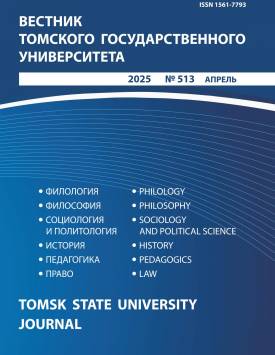Konstantin Batyushkov's life and literary views on Florence
The aim of the research is to study the image of Florence in Russian literature. The material for it was the letters of Konstantin Batyushkov and his article "Something about the Poet and Poetry" (1815), translations of an excerpt from J. de Stael's novel Corinna, or Italy" called "The Glory and Bliss of Italy" (1817), and a fragment from Boccaccio's Decameron called "Pestilence in Florence" (1819). The article uses the traditional historical and literary method. In this regard, it is important to characterize Batyushkov's contribution to Russian literature associated with the creation of the image of the "city of flowers". The history of Batyushkov's acquaintance with Florence is divided into two conditional periods. The first mentions of the desire to visit Italy appear in the poet's letters in 1809-1810. Dreams begin to come true in 1817-1818. Even before leaving abroad, in February 1817, Batyushkov had an idea for a book about Italian literature, which he shared with Nikolay Gnedich. The central place in the Pantheon of Italian literature was to be occupied by the works of Dante, Ariosto, and Boccaccio. The choice of the authors characterizes the literary predilections of the creator of the future book, and, without unnecessary modesty, testifies not only to the preferences, but also to the capabilities of the translator. This is exactly what, in his opinion, does not relate to the temporary and imitative, but to the eternal and original. In 1819, Batyushkov managed to fulfill his dream and visit the "city of flowers". However, he is unpleasantly surprised by the phenomenon of a copy, a repetition without which it is impossible to imagine Florence. He is probably also discouraged by the fact that there is no life in the casts stored in the museum. This is only a semblance of life, which is imprinted in them. Statues and casts, according to the poet, transmit the idea of death. It is striking that Batyushkov rejects what constitutes the essence of the city of flowers -stone, copy, cast. The durable stone arouses Batyushkov's rejection in the same way as the short-lived, ghostly, lifeless straw from the banks of the Arno, which attracts his attention and the attention of the addressees of his letters in February, May, August, October 1819. At the same time, if stone amazes with its eternity, then straw with its fragility, instantaneity, immediacy. One acquires the impression that it is a substitute for life, thus slipping away from life. This is what, with all its concreteness, seems ephemeral, ghostly, unnecessary to Batyushkov. In conclusion, it is noted that in the poet's mind, the modern city he saw is clearly contrasted with the past and eternal city, sung in the works of Dante and Boccaccio. Its name is inextricably linked with the names and works of famous Italian poets - with the embodiment of Hell and the homeland of the exiled Dante and the terrible place of death, sung by Boccaccio. The author declares no conflicts of interests.
Keywords
Batyushkov, Florence, letters, translations, Dante, BoccaccioAuthors
| Name | Organization | |
| Grebneva Marina P. | Altai State University | grmarinagr@mail.ru |
References

Konstantin Batyushkov's life and literary views on Florence | Vestnik Tomskogo gosudarstvennogo universiteta – Tomsk State University Journal. 2025. № 513. DOI: 10.17223/15617793/513/2
